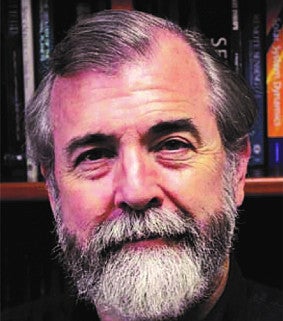Major: Physics
CEO of the Planetary Science Institute

I arrived at the University of Oregon Clark Honors College in the fall of 1973 as a physics major. An error resulted in my being placed in a dorm room in Sheldon Hall with upper classmen and graduate students. During my undergraduate years, I watched Animal House being filmed, explored the beauty of the Cascades and the Oregon coast, studied, and made friends with whom I am still close after 40 years.
In those days, the honors college was a cozy warren in the basement of Friendly Hall, the site of endless discussions, chess games, plans unfolding and collapsing, late nights at the piano, and the occasional drama. The core of the honors college curriculum was “HC Arts and Letters,” a suite of small and diverse courses with options to study a wide range of philosophy, the history of ideas, and communication. These classes expanded my knowledge of Western philosophy, and began the painful process of instilling in me some intellectual rigor. It struck me that the faculty were themselves still engaged in their own intellectual journeys. Perhaps this helped me to push aside the need to find the narrow niche that would define my future self (What do you want to be? What do you want to do?). The honors college gave me the freedom to take the risk of exploring a cacophony of interests.
“ The honors college gave me the freedom to take the risk of exploring a cacophony of interests. ”
— MARK SYKES
One strong interest was space. After my freshman year, I jumped at the opportunity to join an astronomy group as a work-study student. Initially working for Ed Ebbighausen, I began with the analysis of eclipsing binary light curves obtained at the University of Oregon’s Pine Mountain Observatory near Bend, Oregon. I became an author of a scientific paper for the first time. After my sophomore year, I spent summer months up at the observatory, making observations primarily of the first known black hole system, Cygnus X-1. Now I was in Russell J. Donnelly’s group under the supervision of Ira G. Nolt, one of the pioneers of infrared astronomy, a wonderful person who was a major influence on me. Cygnus X-1 photometry became the core of my dissertation, and Ira my advisor.
In those days, undergraduate and graduate students staffed Pine Mountain and we were largely on our own, observing every clear night. During the days, particularly if the weather was not promising, we would journey out into central Oregon, exploring the desert, climbing through lava tubes, and hunting for obsidian. I still have large chunks of the fabled black and gold sheen obsidian in my home and yard from these expeditions. During the academic year, I spent time on the dorm piano and the piano at the honors college, playing and writing music. One summer, I talked the School of Music into allowing me to haul a piano out of one of the practice rooms to Pine Mountain Observatory because, after all, it would still be at a UO facility (it may still be up there!).
After finishing my physics degree requirements, I auditioned for Dean Trotter at the music school and became a music composition major, while continuing to do research in astronomy. It was an intense and wonderful experience, allowing me to find the limits of my talent and be satisfied. I did not finish my composition degree, but graduated with a degree in physics from the honors college, passing my thesis examination “with distinction.”
I continued my existential search that began in the honors college, going into door-to-door sales and spending time in the restaurant business before deciding to pursue graduate studies in applied physics, earning a master’s from what used to be called the Oregon Graduate Center. I returned to space exploration, obtaining a PhD in planetary sciences from the University of Arizona. Today, I am a co-investigator on the NASA Dawn mission to the protoplanetary body Vesta and dwarf planet Ceres in the main asteroid belt. I am the CEO and director of the nonprofit Planetary Science Institute, one of the largest private employers of planetary scientists in the world. And, I am also an attorney, admitted to the Arizona bar. Music is still an important part of my life. This year, I celebrate 30 years as a professional chorister with the Arizona Opera Company. I still play piano and compose.
The honors college enabled me to take on new challenges with confidence, and it is a lesson I continue to apply to my business, intellectual pursuits, and music. The honors college taught me that learning and growing never end.
Mark V. Sykes, PhD, JD, is CEO of the Planetary Science Institute in Tucson, Arizona.
